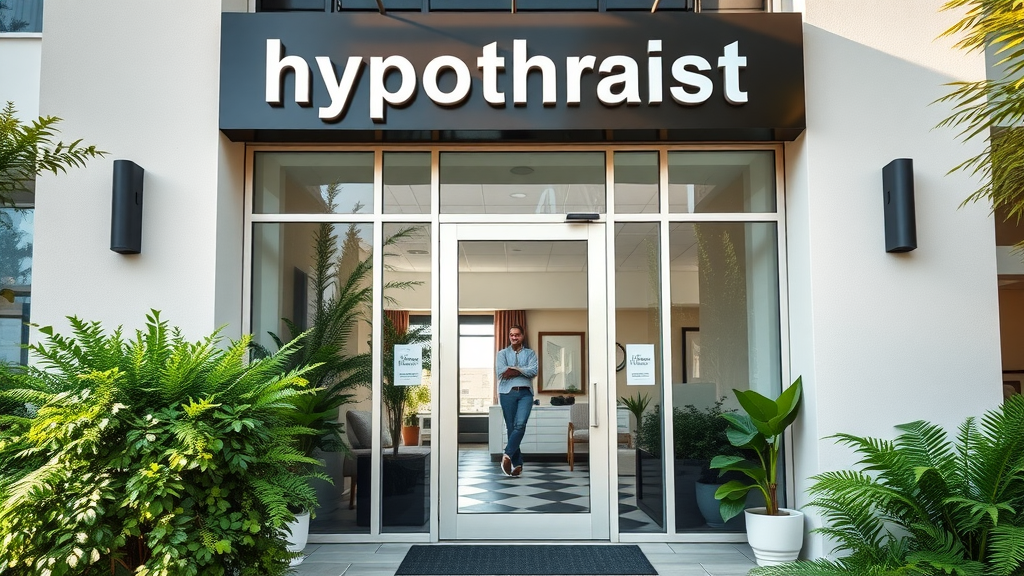Did you know that nearly 80% of adults report experiencing stress so intense that it affects their physical health? This overwhelming statistic places stress at the forefront of modern health concerns. While traditional methods of stress management like mindfulness and therapy are well-known, an unconventional yet highly effective tool is rapidly gaining attention—hypnosis for stress relief. In this comprehensive guide, discover how hypnosis may provide a powerful, research-supported pathway to ease stress, improve resilience, and help you reclaim a sense of calm in your daily life.
Hypnosis for Stress Relief: An Unconventional Path to Stress Management
Hypnosis for stress relief stands apart as an innovative approach within the landscape of stress management techniques. With stress and anxiety issues becoming increasingly common in today's fast-paced world, many are seeking ways to manage stress that not only reduce stress symptoms but also foster long-term psychological well-being. While conventional stress reduction practices like meditation or cognitive behavioral therapy are widely adopted, hypnosis offers a unique, focused state that directly engages the subconscious mind—often where deeply rooted stressors reside. This educational guide delves deeply into what sets hypnosis apart, its effectiveness for stress management, and actionable steps you can take to experience these benefits firsthand.
Whether you are coping with chronic stress or simply seeking new ways to manage your daily life, incorporating hypnosis for stress relief could be a game-changer. Research continues to highlight its potential as both a standalone and complementary therapy. Keep reading to discover how hypnosis can help you reduce anxiety, build resilience, and ultimately transform how you respond to life's stressors.
A Surprising Statistic: How Prevalent is Stress Today?
Recent systematic reviews reveal that chronic stress affects up to four out of five adults at some point in their lives. The global rise in stress prevalence is not just anecdotal; it is supported by large-scale studies showing links between high stress levels and a range of mental and physical health issues, from anxiety disorders to weakened immune function. Workplace stress, social pressures, and overwhelming demands on time have all contributed to the increase, making stress reduction an essential focus in mental health care.
This high prevalence isn't restricted to adults—teens and even children are now facing unprecedented levels of stress, highlighting the urgent need for diverse, accessible stress management solutions. Hypnosis for stress relief is emerging as a promising solution that addresses not only the conscious mind, but also taps into subconscious patterns that perpetuate stress and anxiety, offering hope to those who have found traditional therapies lacking.

Challenging Common Assumptions about Hypnosis for Stress Relief
Many people associate hypnosis with entertainment acts or dramatic portrayals in media, often viewing it as mysterious or even suspect. However, clinical and experimental hypnosis is a well-studied therapeutic technique that enables people to achieve a deeply relaxed, highly focused state. This state allows for the use of hypnotic suggestions to positively influence thoughts, feelings, and behaviors. Research from systematic reviews consistently debunks the myth that hypnosis means losing control—in reality, clients remain aware and in charge throughout the experience. The power of hypnosis for stress relief lies in its ability to bypass the critical conscious mind, reaching the subconscious where patterns of stress and anxiety are often entrenched.
Contrary to common assumptions, hypnosis is a natural state that most people enter daily (such as when absorbed in a book or driving), and its professional application in stress reduction is supported by clinical evidence. This unconventional path is steadily gaining validation among mental health professionals as a highly effective and accessible way to manage stress and build resilience over time.
What You'll Learn About Hypnosis for Stress Relief
Definition and history of hypnosis for stress relief
How hypnosis techniques address stress and anxiety
Benefits supported by systematic review and research
Real-life applications to manage stress effectively
Actionable steps and resources for stress management
Understanding Hypnosis for Stress Relief
What Is Hypnosis?
Hypnosis is a therapeutic technique whereby an individual is guided into a state of deep relaxation and heightened focus—known as a focused state—through verbal cues and guided imagery. This trance-like state reduces the influence of the conscious mind while making the subconscious mind more receptive to positive change. In the context of hypnosis for stress relief, practitioners use carefully crafted hypnotic suggestions to help clients shift unhelpful thought patterns and ease bodily tension, actively supporting both mental health and physical well-being.
During a typical hypnosis session, clients remain fully aware of their surroundings and have complete control. The goal is not to “lose oneself” but rather to harness the power of focused relaxation to enact meaningful, lasting changes in the way the body and mind respond to stress and anxiety. Scientific evidence demonstrates that this process can alter brain wave patterns, promote emotional calm, and even improve physiological markers like immune function.

Brief History: The Origins of Hypnosis for Stress
The roots of hypnosis can be traced back to the 18th century when Franz Mesmer, an Austrian physician, developed techniques that became known as mesmerism. By the 19th century, the clinical relevance of hypnosis grew, with practitioners such as James Braid and Jean-Martin Charcot researching its application for psychological ailments. Hypnosis evolved significantly and, by the 20th century, became recognized as a skilled intervention for stress and anxiety in mainstream healthcare. Systematic reviews and clinical case studies have since established hypnosis for stress relief as both safe and effective, shifting its reputation from mysticism to science-based therapy.
Today, leading psychological associations endorse hypnosis as a valuable adjunct to counseling and behavioral therapy, particularly when dealing with chronic stress and anxiety disorders. Its ability to create powerful, subconscious change is increasingly leveraged in modern stress management strategies.
How Hypnosis Differs From Meditation and Mindfulness for Stress and Anxiety
While hypnosis, meditation, and mindfulness all aim to promote relaxation and reduce anxiety, their methods and effects are distinct. Meditation focuses on awareness and acceptance in the present moment, allowing stressors to arise and pass without judgment. Mindfulness teaches individuals to observe thoughts and emotions without engaging with them, providing a buffer against stressful reactions in daily life. In contrast, hypnosis for stress involves entering a deeply relaxed yet focused state, allowing for direct engagement with the subconscious mind via hypnotic suggestions.
This core difference means that hypnosis can more rapidly address stubborn patterns of stress and anxiety. Instead of only observing or accepting feelings, a hypnotherapy session can actively reprogram the mind’s responses to specific stress triggers, making it a unique and often complementary tool in the broader landscape of stress management.
Systematic Review: Research on Hypnosis for Stress Relief
Key Findings from Systematic Reviews
Multiple systematic reviews and meta-analyses have examined the efficacy of hypnosis for stress relief. These studies consistently report statistically significant reductions in stress and anxiety symptoms following hypnosis interventions, especially when compared to control groups receiving no treatment or standard relaxation techniques. Notably, reviews published in recent years highlight that both individual hypnosis sessions and group-based hypnotherapy have measurable effects on outcome markers such as perceived stress, mood state, and even physical parameters like heart rate.
These findings position hypnosis as a valuable addition to the toolkit for managing stress, often yielding superior results when combined with cognitive behavioral therapy or other evidence-based approaches. Some systematic reviews also underscore that hypnosis is safe for most populations and rarely produces adverse effects, making it a compelling choice for individuals seeking non-pharmaceutical, highly effective stress reduction strategies.
Systematic Review Results: Hypnosis for Stress Relief vs. Other Stress Management Methods |
|||
Method |
Stress Symptom Reduction |
Improvement in Anxiety |
Long-Term Resilience |
|---|---|---|---|
Hypnosis |
High (across multiple studies) |
Significant decrease |
Consistent improvement |
Mindfulness Training |
Moderate (varies by program) |
Noticeable, but slower |
Gradual with practice |
Cognitive Behavioral Therapy |
High (especially for anxiety disorders) |
Significant (when targeted) |
Requires ongoing sessions |
Medication |
Varies (often temporary) |
Good for acute symptoms |
Dependent on continued use |
What The Experts Are Saying
Experts in the field of clinical hypnosis and mental health stress the importance of evidence-based practice. According to therapists and psychologists, using hypnosis for stress relief is not just effective, but often preferable due to its potential for lasting change without the side effects typical of medications. Professional associations highlight both clinical and experimental trials showing that hypnosis improves stress resilience, reduces anxiety, and enhances quality of life for a variety of client populations.

"Hypnosis has clinically significant results in reducing stress and anxiety, especially when combined with complementary therapies." – Dr. Lindholm
How Hypnosis for Stress Relief Works
Scientific Mechanisms: The Role of Hypnotic Suggestions
At the core of hypnosis for stress is the strategic use of hypnotic suggestions. In a relaxed, focused trance state, the subconscious mind is more open to receiving positive instructions. These suggestions can alter how you perceive stressors, challenge maladaptive thinking, and even modify automatic physical responses. Scientific research indicates that hypnotic induction changes brain activity in key regulatory areas—by doing so, it modifies the body’s reaction to stress and anxiety, shifting from the ‘fight or flight’ response to one of rest, repair, and calm.
Further, studies involving brain scans during experimental hypnosis show that guided imagery and verbal cues during a hypnosis session help rewire mental pathways. This leads to not just momentary relief, but also longer-lasting resilience against recurring stress symptoms, especially when hypnosis is practiced regularly or combined with visualizations and relaxation techniques.
The Process: What to Expect in a Hypnotherapy for Stress Session
A typical hypnotherapy for stress session begins with a detailed intake, where your practitioner helps you identify personal stress triggers and wellness goals. Next, you'll be guided through hypnotic induction: a series of spoken cues that encourage deep relaxation and focus. Once this focused state is achieved, the hypnotherapist introduces specific, tailored hypnotic suggestions such as “you feel calm and in control” or “each breath brings you deeper relaxation.”
This process is always client-centered—your input shapes the session so that the experience is empowering and relevant to your unique needs. Some sessions may also include guided imagery or progressive muscle relaxation to deepen stress reduction and promote a holistic sense of well-being. Sessions usually last 45 to 60 minutes, and most people experience noticeable benefits after just a few appointments.

Can Hypnosis for Stress Relief Help Reduce Anxiety?
Research and clinical practice consistently show that hypnosis for stress relief is highly effective in helping individuals reduce anxiety as well as manage stress. During hypnosis, clients often experience a profound sense of calm and increased control over their thoughts and emotions. Over multiple hypnosis sessions, these benefits accumulate, resulting in a measurable reduction in symptoms associated with anxiety disorders—such as racing thoughts, insomnia, irritability, and muscle tension.
Many individuals who struggle with long-standing stress and anxiety report that hypnosis finally breaks the cycle of worry and physical discomfort, giving them a toolkit for stress management that they can use for life. The reduced anxiety experienced through hypnosis is not just temporary; it is often accompanied by enhanced resilience and coping abilities, allowing individuals to navigate everyday challenges with greater ease.
"Clients often report feeling calmer and more resilient after even a few hypnosis sessions for stress management." – Certified Clinical Hypnotherapist
Benefits of Hypnosis for Stress Relief
Short-Term and Long-Term Benefits
One of the greatest strengths of hypnosis for stress relief is its ability to deliver both immediate and lasting benefits. Short-term, clients frequently notice a deep sense of calm immediately following a hypnosis session, with physical symptoms of stress (like a racing heart or tight muscles) noticeably reduced. Longer-term, regular sessions help individuals build sustainable stress management skills, improve their overall mental health, and strengthen their ability to manage stress independently.
Studies show that hypnosis not only helps with acute stressors but also supports ongoing improvements in focus, mental clarity, sleep quality, and even immune function. Over time, individuals develop a more adaptive response to stress, preventing future burnout and enhancing their overall quality of life.
Immediate relaxation and calmness
Enhanced ability to manage stress
Reduction in stress and anxiety symptoms
Improved focus and mental clarity
Long-term resilience and coping skills
Comparing Hypnosis for Stress Relief With Other Stress Management Techniques
When evaluating stress management options, it’s important to compare the unique strengths of each. Hypnosis is especially well-suited for individuals seeking rapid stress reduction solutions that have minimal side effects. Compared to approaches like mindfulness, cognitive behavioral therapy, or medication, hypnosis works quickly and is highly customized to the individual's subconscious thought patterns. This gives it an edge for those dealing with stubborn or deeply rooted stress and anxiety challenges.
For many, combining hypnosis with other techniques—such as mindfulness practice or behavioral therapy—can produce the best overall results in both short- and long-term stress control. Below, the following table summarizes key differences and strengths:
Comparison Table: Hypnosis for Stress Relief vs. Mindfulness, Cognitive Behavioral Therapy, and Medication |
||||
Technique |
Onset Speed |
Customization |
Lasting Change |
Side Effects |
|---|---|---|---|---|
Hypnosis |
Fast |
Highly tailored |
Often long-term |
Minimal |
Mindfulness |
Gradual |
Generalized |
Moderate |
None |
CBT |
Variable |
Structured |
Strong (with sessions) |
Minimal/none |
Medication |
Immediate (for symptoms) |
Limited |
Usually requires ongoing use |
Possible (drowsiness, etc.) |

Who Can Benefit Most from Hypnosis for Stress Relief?
Demographics: Adults, Teens, and Children
While hypnosis for stress relief is widely used among adults, growing evidence highlights its suitability for teens and even children dealing with academic pressure, social anxiety, or trauma-related stress. Hypnotherapy is tailored to developmental needs; practitioners use age-appropriate language and guided imagery to foster a sense of safety and empowerment in younger clients. The universality of stress—affecting people of all backgrounds—means that clinical and experimental hypnosis can be adapted across the lifespan and for a wide range of mental health challenges.
From professionals struggling with workplace burnout to adolescents coping with social stressors and children facing academic demands, hypnosis provides flexible, individualized support. Consulting with a qualified practitioner ensures the approach is both safe and effective for every age group.

Case Studies: Real-Life Stories of Stress and Anxiety Reduction
Many people have reclaimed their lives through hypnosis for stress relief. For example, a 45-year-old manager suffering from persistent stress symptoms experienced marked reduction in anxiety and improved sleep quality after six sessions of clinical hypnosis. In another case, a high school student struggling with social anxiety learned self-hypnosis, leading to greater confidence and academic success. Even children, with proper guidance, can benefit—such as a 10-year-old who managed chronic headaches linked to stress after a short course of hypnotherapy.
These individual stories reflect the widespread benefits routinely seen in systematic review data. By addressing the subconscious patterns that underlie stress and anxiety, hypnosis empowers people to break free from the cycle of worry, exhaustion, and emotional imbalance, restoring well-being and resilience across all areas of daily life.
Common Hypnotic Suggestions for Stress and Anxiety
Sample Hypnotic Suggestions Used to Manage Stress
During hypnosis for stress relief sessions, practitioners employ positive, empowering hypnotic suggestions such as:
You are in control and calm
Each breath brings you deeper relaxation
Stress has less influence over your thoughts and body
These targeted phrases are carefully crafted to help you internalize a state of relaxation and emotional control. When repeated in a focused, relaxed state, such hypnotic suggestions reshape how your mind and body respond to stress triggers—leading to both immediate relief and lasting shifts in your stress management abilities.
Role of Visualization and Guided Imagery
Guided imagery and visualization are integral to the hypnosis process. By mentally picturing a peaceful setting or positive outcome, clients reinforce hypnotic suggestions and activate calming neural pathways. Research shows that these mental exercises can lower heart rate and blood pressure, reduce stress hormones, and enhance feelings of safety and well-being. This dual approach—combining direct suggestions with vivid imagery—makes hypnosis for stress one of the most effective relaxation techniques available.
Guided imagery can take many forms, from imagining a tranquil beach to visualizing stress melting away with each breath. The result is a powerful avenue for reducing anxiety, boosting mental clarity, and promoting holistic wellness in daily life.

Integrating Hypnosis for Stress Relief Into Daily Life
Self-Hypnosis Techniques for Stress Management
One of the key strengths of hypnosis for stress relief is its adaptability to self-practice. With guidance from a qualified hypnotherapist, individuals can learn to induce a relaxed, receptive state at home. Self-hypnosis techniques typically involve quieting the mind, focusing on deep breathing, and repeating calming mantras or suggestions. Over time, even a few minutes of daily practice can help you manage stress responses more effectively and develop lasting resilience.
Popular self-hypnosis tools include:
Progressive muscle relaxation
Breathing exercises
Mantras and affirmations
By dedicating a few minutes daily to these techniques, you can turn the principles of hypnosis into a cornerstone of your ongoing stress management plan, empowering yourself to respond calmly in challenging situations whenever they arise.

How to Find a Qualified Hypnotherapist for Stress
If you’re interested in formal hypnotherapy for stress, finding a skilled and certified practitioner is crucial. Look for hypnotherapists with credentials from nationally recognized organizations such as the American Society of Clinical Hypnosis or the Society for Clinical and Experimental Hypnosis. Professionals practicing in licensed health fields (psychology, counseling, social work) are often the best resource, as they combine hypnotic expertise with a deep understanding of mental health issues.
Start by inquiring about a potential practitioner’s training, experience with stress management cases, and client outcomes. A reputable hypnotherapist will take the time to explain their approach, answer your questions, and provide a safe, supportive environment tailored to your needs.

Safety, Risks, and Limitations of Hypnosis for Stress and Anxiety
Who Should Avoid Hypnosis for Stress Relief?
While hypnosis for stress relief is remarkably safe for most, certain individuals should consult with their healthcare provider before pursuing hypnotherapy. Those with severe psychiatric conditions such as psychosis, certain dissociative disorders, or severe trauma histories may not be suitable candidates, as hypnosis could inadvertently intensify symptoms. Always disclose your complete mental and physical health history to your practitioner prior to beginning hypnosis, and avoid practitioners who promise unrealistic, overnight cures.
For most adults, teens, and children, hypnosis poses minimal risk when applied by a qualified professional—especially when it complements existing mental health care or behavioral therapy. As with any therapeutic intervention, individual experiences will vary, and open communication with your provider is key.

Potential Side Effects and How to Manage Them
Most people tolerate hypnosis for stress relief extremely well, but minor side effects are possible, such as mild drowsiness, vivid daydreaming, or slight disorientation immediately following a session. These effects are generally short-lived and can be managed by drinking water, grounding yourself, and resting if needed. On rare occasions, emotional discomfort may arise if suppressed memories are surfaced—if this occurs, your practitioner can provide support and help you process these experiences safely.
By working with an experienced, certified hypnotherapist and remaining open and communicative, you can expect a positive, empowering, and highly beneficial experience with hypnosis for stress relief.
People Also Ask: Can Hypnosis Relieve Stress?
Can Hypnosis Relieve Stress?
Detailed Answer: Exploring the Effectiveness of Hypnosis for Stress Relief
Absolutely—hypnosis is recognized as a highly effective method for reducing stress and anxiety. Scientific studies and systematic reviews show that individuals who participate in professional hypnosis sessions experience both immediate and lasting reductions in stress symptoms. Hypnosis works by engaging the subconscious mind, helping people reshape their response to stressors, and supporting overall stress management. It is frequently endorsed by mental health experts as a practical, non-invasive way to facilitate deep relaxation and improved coping strategies.
Can I Hypnotize Myself to Stop Anxiety?
Detailed Answer: The Basics of Self-Hypnosis for Stress and Anxiety
Yes, you can use self-hypnosis to manage both stress and anxiety. By learning specific induction techniques—such as deep breathing, progressive relaxation, and positive self-talk—you can trigger a state of calm and redirect anxious thoughts. Regular practice of self-hypnosis helps reduce anxiety over time by reinforcing positive mental patterns in your daily life, enabling you to respond with greater calm and resilience when under pressure.
What Is the Success Rate of Hypnosis for Anxiety?
Detailed Answer: Success Statistics and Study Outcomes
Success rates for hypnosis in the treatment of stress and anxiety vary depending on individual factors and the skill of the practitioner, but systematic reviews report significant improvement in the majority of cases. Around 70–80% of individuals experience meaningful reductions in anxiety symptoms when hypnosis is used consistently. Combining hypnosis with other treatments, such as cognitive behavioral therapy or mindfulness, can further enhance outcomes, making it a powerful tool in the fight against anxiety disorder and related conditions.
How Is Hypnosis Used for Anxiety?
Detailed Answer: Applications of Hypnosis in Stress and Anxiety Reduction
Hypnosis for anxiety typically involves guiding the client into a relaxed, focused trance and delivering targeted suggestions designed to foster calm, strengthen coping skills, and change unhelpful thought patterns. Practitioners may use guided imagery to help the individual envision themselves overcoming specific anxieties, while reinforcing positive behaviors and beliefs at the subconscious level. This technique is increasingly popular as a supplement to other behavioral therapy methods, and is associated with rapid, sustainable improvements in how clients manage stress and anxiety day-to-day.
Frequently Asked Questions (FAQs) About Hypnosis for Stress Relief
How long do the benefits of hypnosis for stress relief last?
Studies indicate that hypnosis can deliver lasting results, especially when practiced regularly or combined with other stress management techniques. Many report ongoing improvements lasting months or even years.Is hypnosis for stress relief suitable for children?
Yes, with a trained practitioner, hypnosis can be adapted for children using age-appropriate language and imagery, addressing academic, social, or trauma-related stress safely and effectively.How often should I practice hypnosis for optimal stress management?
For best results, most practitioners recommend hypnosis sessions weekly at first, with self-hypnosis or guided hypnosis practice 3–4 times per week to reinforce positive changes.Are there any contraindications for hypnosis for stress?
Hypnosis is generally safe, but may not be suitable for individuals with serious psychiatric conditions, certain dissociative disorders, or those experiencing severe trauma; always consult a qualified professional first.
Key Takeaways on Hypnosis for Stress Relief
Hypnosis for stress relief has a growing evidence base
Systematic reviews support its benefits for stress and anxiety reduction
Safe and accessible with guidance
Self-hypnosis empowers ongoing stress management
Start Your Journey: Explore Hypnosis for Stress Relief with an Expert Today
Take the next step toward a calmer, more resilient you by exploring hypnosis for stress relief with a qualified expert—your journey to lasting stress management and improved mental health can start today.
 Add Row
Add Row  Add
Add 




Write A Comment